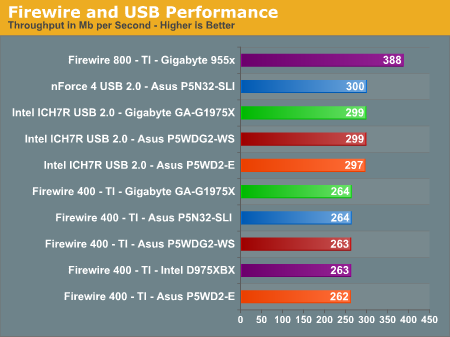Intel D975XBX: Intel brings their Bad-Axe to Market
by Gary Key on January 26, 2006 12:05 AM EST- Posted in
- Motherboards
Firewire and USB Performance
After looking at many options for Firewire and USB testing, we finally determined that an external USB 2.0, Firewire 400, and Firewire 800 hard disk would be a sensible way to look at USB and Firewire throughput.
Our first efforts at testing with an IDE or SATA drive as the "server" yielded very inconsistent results, since Windows XP sets up cache schemes to improve performance. Finally, we decided to try a RAM disk as our "server", since memory removed almost all overhead from the serving end. We also managed to turn off disk caching on the USB and Firewire side by setting up the drives for "quick disconnect" and our results were then consistent over many test runs.
We used 1GB of fast 3-2-2-8 system memory set up as a 450MB RAM disk and 550MB of system memory. Our standard file is the SPECviewPerf install file, which is 432,533,504 bytes (412.4961MB). After copying this file to our RAM disk, we measured the time for writing from the RAM disk to our external USB 2.0, Firewire 400, or Firewire 800 drive using a Windows timing program written for AnandTech by our own Jason Clark. The copy times in seconds were then converted into Megabits per second (Mb) to provide a convenient means of comparing throughput. Higher Rates therefore mean better performance in this particular test.
After looking at many options for Firewire and USB testing, we finally determined that an external USB 2.0, Firewire 400, and Firewire 800 hard disk would be a sensible way to look at USB and Firewire throughput.
Our first efforts at testing with an IDE or SATA drive as the "server" yielded very inconsistent results, since Windows XP sets up cache schemes to improve performance. Finally, we decided to try a RAM disk as our "server", since memory removed almost all overhead from the serving end. We also managed to turn off disk caching on the USB and Firewire side by setting up the drives for "quick disconnect" and our results were then consistent over many test runs.
We used 1GB of fast 3-2-2-8 system memory set up as a 450MB RAM disk and 550MB of system memory. Our standard file is the SPECviewPerf install file, which is 432,533,504 bytes (412.4961MB). After copying this file to our RAM disk, we measured the time for writing from the RAM disk to our external USB 2.0, Firewire 400, or Firewire 800 drive using a Windows timing program written for AnandTech by our own Jason Clark. The copy times in seconds were then converted into Megabits per second (Mb) to provide a convenient means of comparing throughput. Higher Rates therefore mean better performance in this particular test.











34 Comments
View All Comments
ruprecht - Thursday, January 26, 2006 - link
What the hell is wrong with Americans? Just say bad ass, it's hardly a hard-core expletive!yacoub - Friday, January 27, 2006 - link
Professional image versus immaturity. Anandtech has a professional image and likely wants to maintain it.Griswold - Friday, January 27, 2006 - link
...land of the free. Whatever.DigitalFreak - Thursday, January 26, 2006 - link
We're prudes! Well, not me, but...Avalon - Thursday, January 26, 2006 - link
This board is pretty pitiful, IMO, when several other solutions out there can outpace it. Unless the board is offered cheaper than the competition, I see no reason to buy it.JarredWalton - Thursday, January 26, 2006 - link
Intel's proven reliability and support. Some people will happily give up 10% or more performance just for a major name like Intel. I'm not one of them, but they do exist.... :)yacoub - Friday, January 27, 2006 - link
But you pay a lot more for it...Zebo - Friday, January 27, 2006 - link
No knowledgeable computer hardware expert seriously believes that there is enough of a stability difference between the platforms to warrant a scientific comparison or research study by an objective outsider. Most "issues" stem from OE or bloated buggy SW and drivers, simple as that - not the hardware itself.Toms tries such a comparison but as you know a sample size of one is'nt very scientific so we'll discount intels 11 reboots two Asus boards, two intel boards, one gigabit board to AMD's 0 reboots in the stress test.:D:)
Zebo - Friday, January 27, 2006 - link
Or should I say where's the proof over anything else? Sounds like urban legend to me. Something the intel boys claim with almost programed resposivness then stop replying in that thread once asked for proof.Sunbird - Thursday, January 26, 2006 - link
Excuse my ignorance, is Bad Axe a new american slang word?